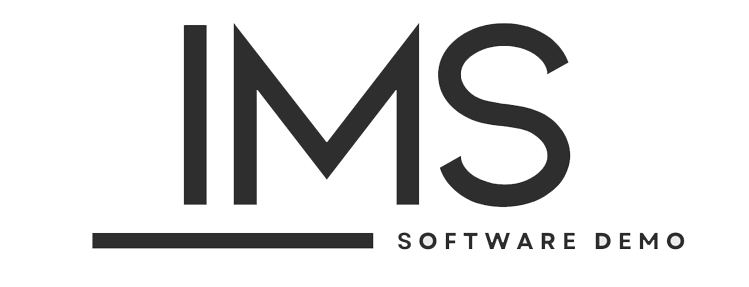About Institute management In India
Institute management In India
Institute Management Software is a comprehensive solution designed to manage and streamline administrative functions in educational institutions such as schools, colleges, universities, coaching centers, and other training institutes. These systems help institutions manage student records, faculty details, academic schedules, fee collections, exams, and communication efficiently.
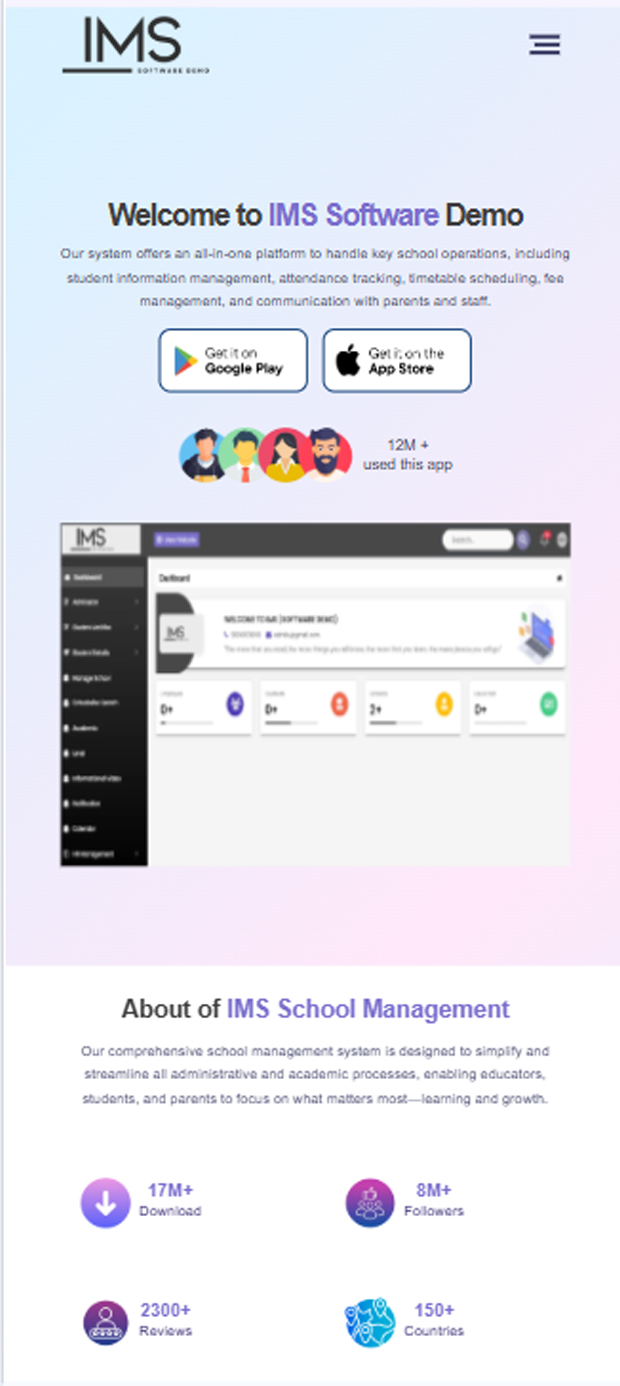
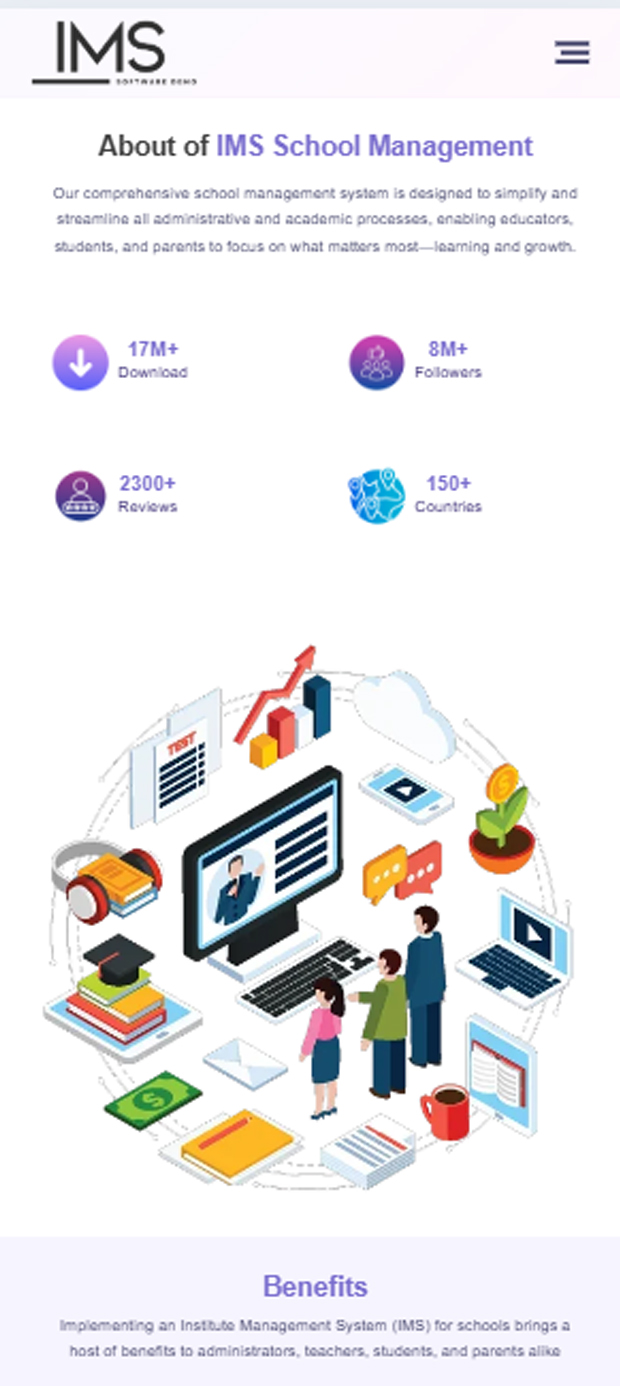
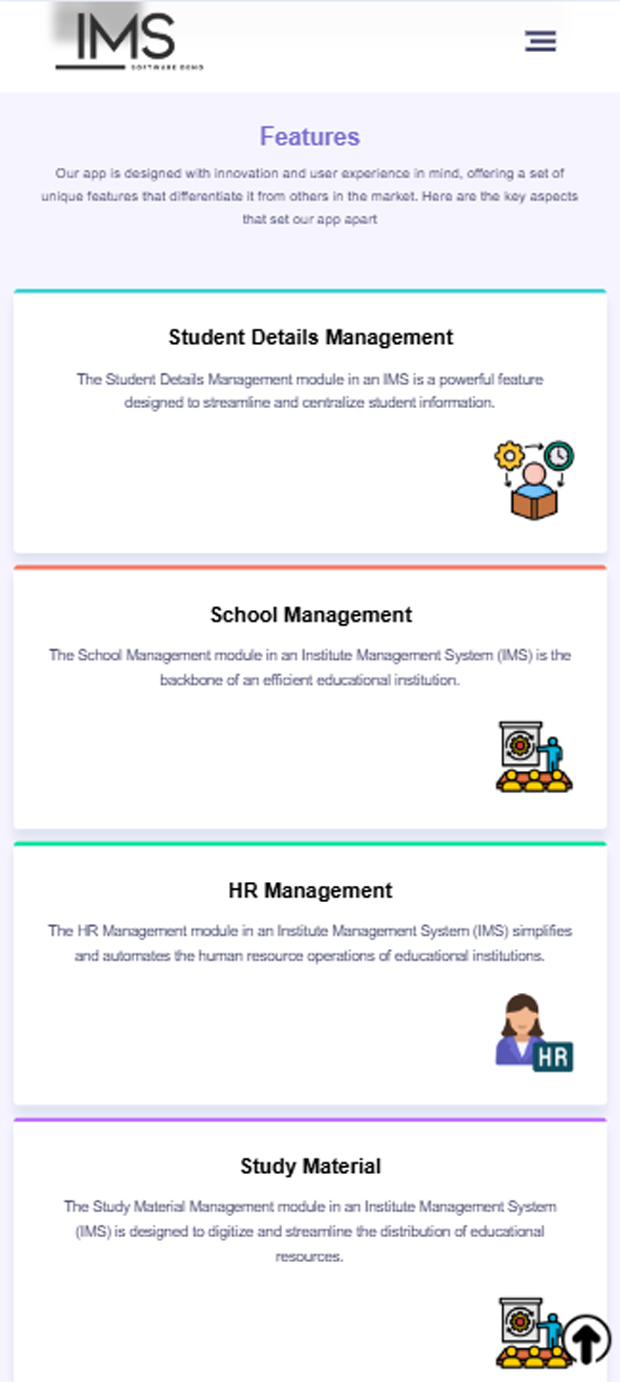
Benefits
Implementing an Institute Management System (IMS) for schools brings a host of benefits to administrators, teachers, students, and parents alike
Streamlined Administrative Tasks
Automates routine operations like admissions, attendance tracking, Fee collection.
Enhanced Communication
Centralized communication platform for students, teachers, and parents.
Improved Academic Performance
Tools for lesson planning, exam scheduling, and grading help teachers focus on quality education.
Data-Driven Decision Making
Advanced reporting and analytics provide actionable insights into academic and administrative performance.
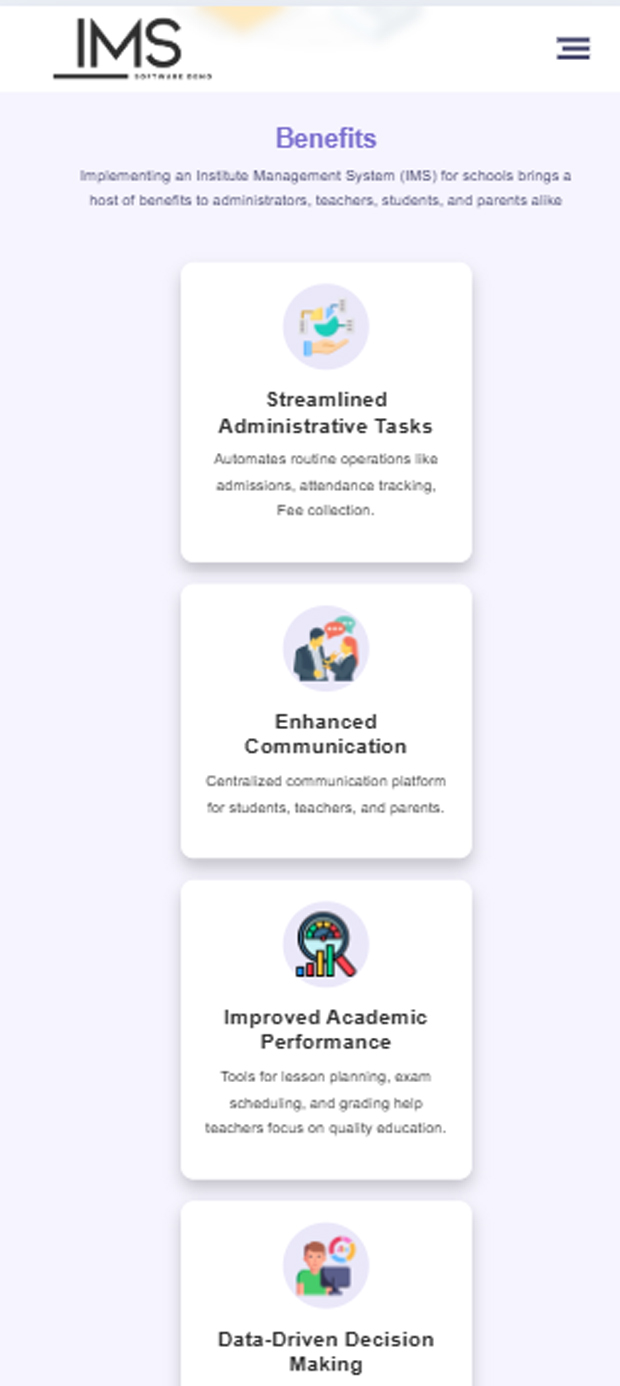
Secure and Compliant
Robust data security measures protect sensitive information like student records and financial data.
Scalability and Flexibility
Adaptable to schools of all sizes, from small institutions to large campuses.
Eco-Friendly Operations
Go paperless with digital records and communication tools.Support sustainability while reducing administrative costs.
Audit-Ready Anytime
Keep all records organized for easy access during inspections or audits.
How To Choose IMS Software
If you are considering purchasing Institute Management System (IMS) software for your institution, there are a few key factors to consider when making your decision:
Key Features of Institute Management Software:
Student Management:
- Student Enrollment: The software allows institutions to manage the enrollment of students, including personal details, academic history, and contact information.
- Student Profiles: Maintains individual student profiles, tracking academic progress, attendance, grades, and behavioral reports.
- Student Attendance: Records student attendance, calculates attendance percentages, and sends automated alerts to parents or guardians in case of absenteeism.
- Admission Management: Manages the entire admission process, including application forms, document verification, and seat allocation.
Course Management:
- Course Registration: Allows students to register for courses online, including elective and core courses.
- Course Scheduling: Helps create and manage timetables, assigning teachers to classes, and ensuring no scheduling conflicts.
- Curriculum Management: Administrators can manage and update the syllabus for different programs and courses.
- Classroom Management: Allows for managing classrooms, scheduling them for courses, and avoiding conflicts.
Faculty Management:
- Faculty Records: Stores detailed information about faculty members, including qualifications, teaching history, and salary details.
- Faculty Scheduling: Assigns teaching responsibilities, manages office hours, and ensures faculty members are available for scheduled classes.
- Leave Management: Tracks faculty leaves and absences, and automatically updates schedules.
- Payroll and Salary Management: Manages salary disbursement, deductions, bonuses, and ensures compliance with tax regulations.
Examination and Assessment:
- Exam Scheduling: Automates the scheduling of exams, avoiding conflicts, and informing students and faculty about the exam schedule.
- Online Examination: Supports online exams, including MCQs, essays, and other formats, making it easier to conduct assessments.
- Results Management: Records exam results, generates grade cards, and calculates overall academic performance.
- Gradebook: Allows teachers to enter grades for assignments, quizzes, and exams, and generate report cards automatically.
- Exam Reports: Provides detailed reports on student performance, identifying areas where students may need additional support.
Fee Management:
- Fee Collection: Manages fee collection for tuition, hostel, library, and other charges, offering online and offline payment options.
- Fee Receipt Generation: Automatically generates receipts for payments made by students and sends them to parents.
- Fee Reminders: Sends automated reminders to students and parents about upcoming fees or overdue payments.
- Fee History: Tracks the fee payment history of students, including outstanding dues and previous payments.
Library Management:
- Book Cataloging: Manages a catalog of books, journals, and other resources available in the library, allowing students to search and borrow books.
- Issue and Return Management: Tracks the issue and return dates of books and sends reminders to students for overdue items.
- Library Access Control: Allows for managing library user access and maintaining records of who borrowed which book.
- Inventory Management: Helps maintain the library’s inventory, ensuring that books and other resources are properly accounted for.
Communication Management:
- Internal Messaging: Allows communication between students, faculty, and staff, helping ensure seamless interaction.
- Notifications & Alerts: Sends alerts about upcoming exams, events, fee due dates, class cancellations, or any other important announcements.
- Parent-Teacher Communication: Facilitates communication between teachers and parents regarding student progress, behavior, and attendance.
Hostel Management:
- Room Allocation: Manages room assignments for students in the hostel, including tracking vacancies and the allocation process.
- Hostel Fees: Keeps track of hostel fee payments, generating receipts and reminders for students.
- Amenities Management: Tracks hostel amenities like laundry, food, security, and any other additional services.
- Student Movement: Monitors student movement within the hostel, such as entry/exit times and other logistical details.
Transport Management:
- Bus Route Management: Manages bus routes, vehicle schedules, and stops.
- Student Transportation: Keeps track of students' transportation needs, such as assigned buses and seat availability.
- Driver and Vehicle Management: Manages driver schedules, vehicle maintenance, and insurance details.
Inventory and Asset Management:
- Asset Tracking: Tracks and manages institutional assets like computers, projectors, lab equipment, and other resources.
- Inventory Management: Keeps track of classroom supplies, teaching materials, stationery, and other consumables.
- Stock Alerts: Sends automatic alerts when the inventory is running low and needs to be replenished.
Report Generation and Analytics:
- Custom Reports: Generates custom reports on academic performance, fee collections, faculty performance, and other metrics.
- Data Analytics: Provides insights into student performance trends, attendance patterns, and financial health of the institution.
- Dashboard: Provides a visual representation of the institution's performance, including student enrollment, financials, and more.
User Management and Access Control:
- Role-Based Access: Controls access to sensitive data, allowing administrators to define different user roles (e.g., student, teacher, admin) with varying levels of permissions.
- Audit Trails: Maintains logs of all actions performed in the system for security and accountability purposes.
Online Learning and E-Learning Integration:
- Online Classes: Integrates with online learning platforms like Zoom, Google Meet, or Microsoft Teams to allow remote learning.
- Content Delivery: Facilitates the distribution of e-learning content like videos, PDFs, and quizzes.
- Assignments and Grading: Supports the submission of online assignments, grading, and feedback.
- Alumni Management:
- Alumni Database: Maintains records of alumni, their contact details, and career progress.
- Networking: Offers platforms for alumni to network with each other and with current students.
- Alumni Events: Helps organize alumni meet-ups, reunions, and other events.
- Mobile Access:
- Mobile App: Many institute management software solutions provide mobile applications for students, faculty, and parents to access information on the go.
- Push Notifications: Sends push notifications about upcoming exams, assignments, events, and more.
Benefits of Institute Management Software:
- Improved Efficiency: Automates routine administrative tasks, reducing manual work and increasing overall efficiency.
- Better Communication: Improves communication between students, faculty, staff, and parents, ensuring that everyone stays informed.
- Enhanced Data Management: Centralizes all student data, academic records, financial information, and more, making it easy to access and manage.
- Time-Saving: Automates tasks like fee reminders, attendance tracking, and report generation, saving time for administrators and staff.
- Reduced Errors: Reduces the chances of human error in tasks like grading, fee calculations, and attendance recording.
- Better Decision-Making: Data analytics and reporting features allow administrators to make more informed decisions regarding resources, planning, and management.
- Scalability: Supports the growth of institutions by offering scalable solutions that can accommodate increasing numbers of students, courses, and faculty.
Popular Institute Management Software:
- Fedena: A popular school management software with features like fee management, exam management, and student attendance.
- Tally Education: Known for its financial management and accounting features, Tally can also be used for managing student fees and other administrative tasks.
- Schoology: A learning management system (LMS) with tools for course management, communication, and assessment.
- QuickSchool: Provides a suite of features for school management, including gradebooks, attendance, and report cards.
- EduSec: An all-in-one educational ERP system that handles everything from admissions to alumni management.
- Moodle: Primarily known as an LMS but also offers extensive tools for managing education at different levels.


